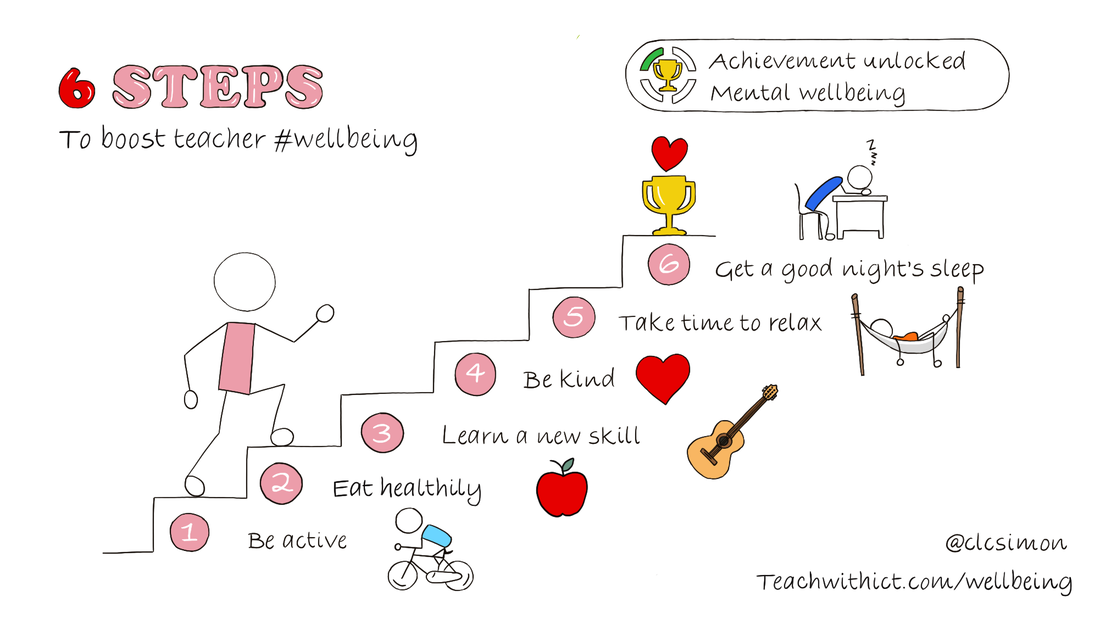6 Steps to BOOST Teacher Wellbeing
The Ultimate Guide to Boosting Teacher Wellbeing: 6 Simple Strategies to Try Today!
Evidence suggests there are 6 steps you can take to improve your mental health and wellbeing. Trying these things could help you feel more positive and able to get the most out of life.
1. Be Active
Our physical health has a big impact on how we feel. Doing as little as 30 minutes a day can have huge benefits not only to your health but also your wellbeing. Regular exercise has been shown to:
Top tips:
You may also be interested in:
2. Eat healthily
4. Healthy eating: Eating a balanced and nutritious diet can help teachers feel better physically and emotionally. Teachers can prioritize their wellbeing by planning healthy meals, avoiding sugary or processed foods, and incorporating fruits, vegetables, and whole grains into their diets.
Try to eat healthy, well-balanced meals, drink enough water and exercise regularly.
You may also be interested in:
Our physical health has a big impact on how we feel. Doing as little as 30 minutes a day can have huge benefits not only to your health but also your wellbeing. Regular exercise has been shown to:
- help raise self-esteem
- aid in the reduction of depression and anxiety
- help relieve stress
Top tips:
- Find free activities to help you get fit such as these 60 second activities suggested by the Youth Sport Trust or our Teacher5aday 30 day challenge.
- If you have a disability or long-term health condition, find out about getting active with this free NHS disability activity guide: https://www.nhs.uk/live-well/exercise/get-active-with-a-disability/
- Exercise as a whole family with these fun activity bingo cards.
You may also be interested in:
2. Eat healthily
4. Healthy eating: Eating a balanced and nutritious diet can help teachers feel better physically and emotionally. Teachers can prioritize their wellbeing by planning healthy meals, avoiding sugary or processed foods, and incorporating fruits, vegetables, and whole grains into their diets.
Try to eat healthy, well-balanced meals, drink enough water and exercise regularly.
You may also be interested in:
3. Learn a new skill
Evidence suggests that learning a new skill can help improve your mental wellbeing by:
By challenging yourself to learn new things, you will not only feel better about yourself but you might also find something to alleviate the boredom and loneliness often brought about by being stuck at home.
Here are a few things you might want to try:
Useful links:
4. Be kind
Evidence shows that random acts of giving and kindness can help improve your mental wellbeing by:
Things to try:
5. Take time to relax
We all know the signs when our body is telling us that we need to slow down however, with the ever-increasing pressures of teaching, it is way too easy to ignore these warning signs! You will often hear the word super-teacher used to describe teachers who work every hour god sends and are still able to function during the working day but, let me tell you, there is nothing super about running yourself into the ground!
At the end of the day, teachers are human too! There is no escaping the fact that, no matter what you do as a teacher, there is always going to be work pending and deadlines due but, instead of ignoring the warning signs, when your body tells you that you need a rest, close the lid on your laptop, put down your books and take a break - your mind and body will thank you for it!
Useful links:
6. Sleep
Good-quality sleep makes a big difference to how we feel, so it's important to get enough! The average healthy adult needs between 7 to 9 hours of sleep per night. Not having enough sleep can raise the levels of hormone called cortisol which, when elevated, is linked to abdominal weight gain. After a good night’s sleep you are well-rested and ready to face the next day.
Top tips:
Useful links:
Evidence suggests that learning a new skill can help improve your mental wellbeing by:
- building your self-confidence and improving your self-esteem
- providing a sense of purpose
- helping you to connect with others.
By challenging yourself to learn new things, you will not only feel better about yourself but you might also find something to alleviate the boredom and loneliness often brought about by being stuck at home.
Here are a few things you might want to try:
- Work on a DIY project. You can find lots of helpful videos and tutorials online, such as Tik Tok and YouTube, to help get you started.
- Learn how to play an instrument.
- Try a new hobby such as photography or gardening.
- Learn a new language.
- Learn a dance routine.
- Sign up for a free online course.
Useful links:
- Five Ways to Wellbeing – Tips for learn new skills: https://www.manchestermind.org/learn-new-skills/
4. Be kind
Evidence shows that random acts of giving and kindness can help improve your mental wellbeing by:
- creating a positive feeling and providing a sense of reward
- providing a sense of purpose
- helping you to connect with others.
Things to try:
- Say thank you to a friend or colleague for something they have done for you.
- Ask a friend, colleague or family member how they are feeling and take time to listen.
- Check on a friend or neighbour and see if they need anything doing such as shopping or medication picking up etc.
- Join in with regular Twitter ‘shout-outs’ such as #KindnessRipples, every Thursday, and #FFed (Follow Friday Education), every Friday.
5. Take time to relax
We all know the signs when our body is telling us that we need to slow down however, with the ever-increasing pressures of teaching, it is way too easy to ignore these warning signs! You will often hear the word super-teacher used to describe teachers who work every hour god sends and are still able to function during the working day but, let me tell you, there is nothing super about running yourself into the ground!
At the end of the day, teachers are human too! There is no escaping the fact that, no matter what you do as a teacher, there is always going to be work pending and deadlines due but, instead of ignoring the warning signs, when your body tells you that you need a rest, close the lid on your laptop, put down your books and take a break - your mind and body will thank you for it!
Useful links:
- Guide to screen addictions and responsible digital use: Complete guide to screen addiction | Compare the Market
6. Sleep
Good-quality sleep makes a big difference to how we feel, so it's important to get enough! The average healthy adult needs between 7 to 9 hours of sleep per night. Not having enough sleep can raise the levels of hormone called cortisol which, when elevated, is linked to abdominal weight gain. After a good night’s sleep you are well-rested and ready to face the next day.
Top tips:
- Set a bedtime for yourself and try your absolute best to stick to it!
- Ban screen time – ‘Blue light’ emitted by devices such as smart phones, tablets etc. can inhibit the production of melatonin (the hormone that tells your body that it’s time to for bed.). Switch off ‘blue light emitting’ devices at least an hour before you go to bed. If your device has a blue light filter, switch this on at night.
- Monitor the temperature / humidity levels in your home / bedroom – The optimal temperature for a good night’s sleep is between 15 and 19 degrees Celsius (60 to 67 degrees Fahrenheit). The ideal humidity levels for sleeping are between 30% and 50%. Air that is too dry (less than 30% humidity) can disrupt your sleep and also make you more susceptible to catching a cold. Humidity levels too low? Invest in a humidifier!
Useful links:
- A teacher’s guide to sleep – and why it matters: https://www.theguardian.com/teacher-network/teacher-blog/2014/nov/11/good-night-teacher-guide-sleep
You may also be interested in:
Disclaimer
teteachwithict.com is not responsible for the content of external websites linked from its pages.
It’s always recommended that you seek advice from your GP or a health professional before trying something new, especially if you have pre-existing health issues, pregnant, over 70 or in any pain.
teteachwithict.com is not responsible for the content of external websites linked from its pages.
It’s always recommended that you seek advice from your GP or a health professional before trying something new, especially if you have pre-existing health issues, pregnant, over 70 or in any pain.



